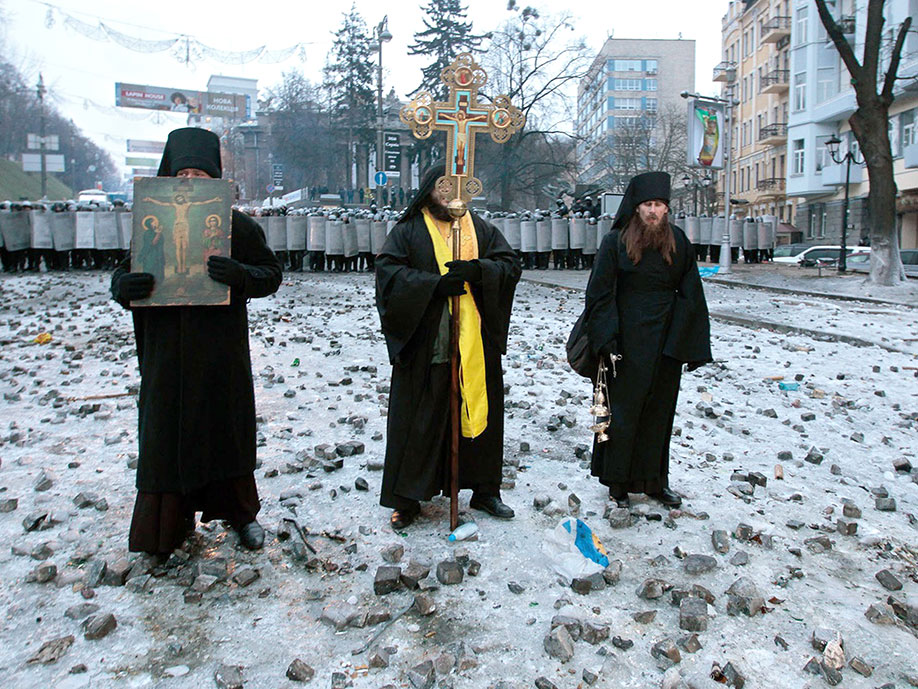We believe in one God who reveals Himself in three persons: the Father, Son and Holy Spirit. We proclaim this reality of God in our prayers, and we find the foundations of this in the Word of God. Yet, if we read the Bible carefully, we realize that God revealed Himself in time, in a build-up of self disclosing. The very same can be said of the Holy Spirit. Of course, He has always been there. He chose to show Himself little by little. This is why the authors of the Bible, inspired by the same Holy Spirit, recognized His presence in a crescendo of knowledge and intuition.
The Spirit of God is present at creation, at the very start of our adventure. In the first verses of Genesis, we are told that God created the universe and the “Spirit of God hovered over the waters.” Then the “earth had no form and was void, darkness was over the deep.” It is a very depressing situation. The land has no shape and it is deserted. Darkness is a negative reality throughout the Bible. It represents the contrary of God’s will: light, salvation, life. At the beginning, creation is still in chaos, which means death and it is in antithesis to what will come later: harmony, life, beauty. Creation is the moment when God refuses the negative and opens the way to a new reality. Over the shapeless and void, hovers the Spirit of God. The Hebrew word used here (merahefet) is used only two other times in the Bible. It has the meaning of shacking, flying. Yet, later commentators – both Jews and Christians – read this word to mean “to brood.” However it is interpreted, we see the presence of God through His Spirit. A presence that means birth of a new reality and care for creation.
The Spirit is present at Creation. Even the psalms remind us of that. “When you send forth your Spirit, they are created, and the face of the earth is renewed” (104:30). The Spirit will be present at the end, at the moment of judgment. The Spirit is present throughout salvation history and escorts the human being in his journeys towards God.
The word used in this text to refer to the Spirit is ruah, literally wind. While the meaning of ruah changed in time, often, the presence of God’s Spirit is linked to wind. It is with a puff of breath that God gives life to the human being in Genesis 2:7. It is in the gentle murmur of the breeze that Elijah encounters God on Mount Horeb (1 Kings 19:12ff). In later books, ruah becomes more and more a word related to restoring life. In Ezekiel 37, the dry bones are revived with the ruah hayyim, the breath of life. After Israel returned from exile in Babylon, the prophets understood a deeper reality: they were able to bring forth the Word of God because of the action of the Spirit of God (Ruah Yhwh). Prophecy was the work of the Spirit in them, “through the Spirit by means of the prophets” (Zech 7:12). In an even later period, the word ruah lost its meaning of a physical reality – the wind – and came to refer to God as person. It is in this context that Israel could start talking of a Holy Spirit. We find an example in Is 63:10, a section of the Book of Isaiah which was edited a few centuries before Christ.
The second part of the Book of Isaiah builds up on this new notion of the Spirit as a personal manifestation of God. When the prophet foresees the arrival of a man whom he calls the Servant of Yahweh, Isaiah says: “He is My Chosen One, I have put my Spirit upon Him, He will bring justice to the nations” (42:1). Isaiah connects the Spirit to a person who acts on his behalf and his word will become a reality because of the action of the Spirit. The Messiah will then be a person guided by the Spirit and able to act on behalf of God. Little by little, the Holy Spirit is understood with a proper personality, a vision and a scope in His work. Israel would never reach the conclusion of a Trinitarian God. Yet, the chosen people contributed much in developing our understanding of the Holy Spirit. The great prophets of Israel read history backwards and pointed to the presence of the Spirit throughout the Salvation journey. They saw the Spirit’s presence on Sinai, in the exile, and in the rebuilding of Jerusalem. They envisioned a people of God on whom the Holy Spirit would come, to allow for a new creation, a moral and physical rebirth that would enable humanity to find full communion with God. In other words, they understood the intimate connection between the Spirit and the mission of Israel in the world: that people may come to know the One true God. By the time of the coming of Jesus, the Jews believed in the presence of the Spirit in their lives, and expected the Spirit to raise the Messiah from amongst them.
The Spirit and Jesus
When Jesus visited the synagogue of Nazareth at the beginning of His ministry, He was handed the scroll of the prophet Isaiah (Lk 4:16ff). He read: “The Spirit of the Lord is upon Me.” After handing over the scroll, Jesus said: “These words come true today as you listen.” In reality, Luke tells us of the role of the Holy Spirit in Jesus’ life since the very beginning of the Gospel. In the Annunciation (Lk 1:26ff), the angel tells Mary, “the Holy Spirit will come upon you.” The Spirit fills Zechariah and Simeon. John the Baptist is also moved by the Spirit and prophesizes that the Messiah is near and will baptize with Holy Spirit and fire (3:16). Jesus will later come to the Jordan to be baptized by John. On that occasion, “the Holy Spirit came down upon Him in the bodily form of a dove and a voice from heaven was heard, “You are My Son, the Beloved One, You are My Chosen One” (3:21). Soon afterwards, Jesus – full of the Holy Spirit – goes to the desert. From there, Luke tells us, He goes back to Galilee and acted with the power of the Spirit (4:14). The first chapters of Luke’s Gospel are filled with references to the action of the Holy Spirit in Jesus’ life. The impression one has is that it is the Spirit that guides history and prepares the way before Jesus.
The Holy Spirit descending on Jesus in the shape of a dove, reminds us of the Spirit hovering over the primordial waters in Genesis. As in Genesis, the Spirit of God broods over nature to hatch a new reality; here, He seems giving Jesus strength and direction in His ministry. The first three Gospels show us Jesus acting by the power of the Spirit and chasing the evil spirits with the support of the Holy Spirit. These Gospels do not have an organized teaching about the Spirit, but they underline His presence in Jesus life and ministry. Jesus also teaches that the Holy Spirit will continue His action in the world supporting the believers in moments of oppression (Mt 10:20 in the missionary commission; Mk 13:11 in the talk about the end of times; Lk 12:12 in the exhortation to witness one’s faith). When He commands the Apostles to baptize in the “Name of the Father, and of the Son and of the Holy Spirit” (Mt 28:20), Jesus underlines the close relationship of the disciple’s life with His own. The baptized receives the imprint of the Holy Spirit, like Jesus did at the Jordan.
The Gospel of John approaches the theme of the Spirit in a different perspective. Jesus’ Words are all from ‘Spirit and Truth.’ And those who want to follow Him must be reborn in the Spirit (3:6: meeting with Nicodemus). Speaking with the Samaritan woman, Jesus emphasizes that the new believers are those who adore ‘God in Spirit and Truth’ (4:24). In the fourth Gospel dedicated, in length, to the last hours of Jesus with the disciples, He speaks of the Spirit. He calls Him the Counselor or Helper (14:16), indicating that the Spirit will support the believers in their lives (15:26). It is the Spirit that will lead the faithful to the whole truth (16:13).
The Word of God helps to understand how the believers realized the presence and action of the Spirit of God through the centuries. In the Old Testament, this presence and action was first of all assigned to God, the only One. Little by little, people realized that God intervened through His Spirit. That is, God really acted in history, yet His presence was not simply spiritual or material. Who acted in history was a real Person; the relationship with Him was real, yet defied easy explanations. Finally, in Jesus, there is the realization that God is a communion of love in three persons. They are distinct, yet One. In His earthly life, Jesus is a beneficiary of the Holy Spirit. After the Resurrection, Jesus becomes the One who sends the Holy Spirit. “He has been exalted at God’s right side and the Father has entrusted the Holy Spirit to Him; the same Spirit He has just poured upon us as you see and hear” (Acts 2:33).
John relates how Jesus appeared to the Apostles. “Jesus said to them ‘Peace be with you. As the Father sent me, so I am sending you.’ Then He breathed on them and said to them: ‘Receive the Holy Spirit’” (Jn 20:21-22). From now on, the community of believers has a mission; they share in the work of the Lord. For this, they are sent into the world. Jesus also equips them with the tool they will need most: the gift of the Holy Spirit. The Spirit who would lead the community to testify to the Resurrection and transform the world they live in.
The Spirit moves the community
The Holy Spirit enters into the life of the community on Pentecost. The Apostles, recluse in the upper room for fear of the people, suddenly become courageous to stand and proclaim that Jesus is Lord (Acts 2). The gift of the Spirit may be seen here in its complexity. First of all, the Spirit enables the community to testify to its faith. Secondly, the Spirit suggests the content of the proclamation. Thirdly, the Spirit helps the listeners to understand the message. From that moment on, the Spirit becomes the force behind evangelization. Peter will be able to say that “we and the Holy Spirit are witnesses of these events” (5:32). Filled with the Holy Spirit, the disciples become closer to the Apostles, especially Stephen (6:3-10). Peter and John give the Spirit to the Samaritans who accepted Jesus as the Messiah. Even political events, like the persecution of the first community (8), are understood as a tool in the hands of the Spirit. Philip is forced to flee Jerusalem and, in doing so, he is able to convert the Ethiopian. The Spirit then takes him to Azotus (8:40) where he continues to preach. Again, it is the Spirit who intervenes to confirm Paul’s conversion (9:17). Peter listens to the Spirit (10:17) and is so able to preach the Good News to the pagans. They convert and receive the gifts of the Spirit. All the missionaries appearing in the Book of Acts are said to be moved by the Spirit. Most important of all, the Spirit is the true leader of the council of Jerusalem.
In Acts 15, we read that the emerging Church was on the verge of splitting. Some wanted all believers to follow the Jewish Law. This meant asking non-Jewish people first to become Jews – which implied circumcision, obedience to dietary laws, change of liturgy, etc. Only then, could they be followers of Christ. Others realized that the request could have brought the end of the mission. It was also a betrayal of Jesus’ message. The leaders of the first Church met in Jerusalem to find a solution. After long discussions, Peter and the other Apostles sent out a message to the various communities stating that the decisions came from them ‘and the Holy Spirit’ (15:28). Peter recognizes that the deliberations of the council had been guided by the Spirit and that the decisions taken were not simply a human mediation but the will of God. The Holy Spirit is the real force behind the work of the Church. When the Church listens to the voice of the Spirit, it progresses in its mission. When the Church is inattentive to the voice of the Spirit, its path diverges from the one wanted by God and the mission fails.
The other books of the New Testament are filled with teachings about the Holy Spirit. There is no single text that offers a complete vision of the relationship of the Spirit with the Church. There are, however, many references to His work. From these, we learn that the Spirit is present in all the baptized persons and enables them to form a unity (1 Cor 12:13). Every member of the body of the Church is equal to the others, shares a common link with God the Father, and lives and moves, thanks to the same Spirit. Most important of all, the Spirit helps all to believe in the same Jesus as Lord. Unity of faith does not mean refusal of diversity within the Church. In fact, the Spirit promotes the emerging of different ways of living the faith. “There is only one Spirit, but a variety of gifts,” says Paul to the Corinthians (1 Cor 12). Paul describes various situations of ministry, which mean service. All these services are important for the community. The Spirit inspires some to serve others and provides them with the gifts they need to fulfill their role. We understand then that unity does not mean uniformity. Each Christian is called to be open to the work of the Spirit and serve Church and society in the diversity of ministries.
The Holy Spirit is divine, yet lives in us. It is not surprising that the Spirit takes care not only of our spiritual lives, but also of our bodies. “The Spirit of Him who raised Christ from among the dead is within you. He who raised Christ from among the dead will also give life to your mortal bodies. Yes, He will do it through His Spirit who dwells within you” (Rom 8:11). The hope of a new life is not a fairy tale, a story told to simple minds to keep people at bay. The Spirit ensures us that there is a future even in our mortal bodies. Certainly, there is life after death, and we shall share in Christ’s Resurrection. Yet, we cannot forget that the Spirit moves the Church in transforming the world into a new Earth where people can live fulfilled lives before God. Hope is a gift of the Spirit. A gift that becomes true any time a person is open to the action of the Spirit and accepts to testify to his faith by living a life of service to others.















